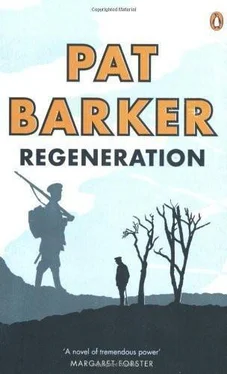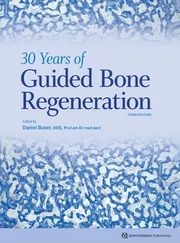Sassoon, who’d got up and walked across to the window, turned round when a movement from Rivers seemed to indicate he’d finished. ‘It’s all right,’ he said. ‘Don’t feel you have to say something.’
But Rivers was not capable of saying anything. He’d taken off his glasses and was dabbing the skin round his eyes. Sassoon didn’t know what to do. He pretended to look out of the window again. At last Rivers put his glasses on again and said, ‘Does the question have an answer?’
‘Oh, yes. I’m going back.’
A long indrawn breath. ‘Have you told anybody else yet?’
‘No, I wanted you to be the first.’
‘Your pacifist friends won’t be pleased.’
‘No, I know. I’m not looking forward to that.’ He was looking at Rivers with an extraordinary mixture of love and hostility. ‘You are, though, aren’t you? You’re pleased.’
‘Oh, yes. I’m pleased.’
Ada Lumb arrived on the nine o’clock train. Sarah met her at the station, and they spent the morning looking round the shops. Or rather Sarah looked round the shops, while her mother, by a mixture of bullying, wheedling, cajoling, questions, speculations, wild surmises and sudden, bitter silences, extracted the whole story of Sarah’s relationship with Billy Prior. By twelve, Sarah was glad to rest her feet, if not her ears, in a café, where they sat at a table for two by the window and ordered ham and chips. The alternative was steak and kidney pie, but Ada was having none of that. ‘You can’t trust anything with pastry wrapped round it,’ she said. ‘What they find to put in it, God knows. You’ve only got to look in the butchers to see there is nowt.’
Sarah was not deceived. She knew once the waitress was out of earshot she was in for a dollop of advice on rather more serious matters. She wiped a hole in the condensation on the window. Outside the people were moving shadows, the pavements of Princes Street jumped and streamed with rain. ‘Just in time,’ she said.
‘I suppose you let him in?’
‘What?’
‘You don’t say “what”, Sarah. You say “pardon”.’
‘What?’
‘I said, I suppose you let him in?’
‘Isn’t that my business, Mam?’
‘Would be if you were gunna cope with the consequences.’
‘There aren’t going to be any consequences.’
‘You think you know it all, don’t you? Well, let me tell you something, something you don’t know. In every one of them factories there’s a bloke with a pin. Every tenth one gets a pin stuck in it. Not every other one, they know we’re not fools. Every tenth.’
‘Nice work, if you can get it.’
‘Easier than bringing up the kid.’ Ada speared a chip. ‘The point is you gotta put a value on yourself. You don’t, they won’t. You’re never gunna get engaged till you learn to keep your knees together. Yeh, you can laugh, but men don’t value what’s dished out free. Mebbe they shouldn’t be like that, mebbe they should all be different. But they are like that and your not gunna change them.’
The waitress came to remove their plates. ‘Anything else, madam?’
Ada switched to her genteel voice. ‘Yes, we’d like to see the menu, please.’ She waited till the waitress had gone, then leant forward to deliver the knock-out blow. ‘No man likes to think he’s sliding in on another man’s leavings.’
Sarah collapsed in giggles. ‘Mam.’
‘Aye, well, you can laugh.’ She looked round the café, then down at the table, smoothing the white table cloth with brown-spotted hands. ‘Nice, isn’t it?’
Sarah stopped giggling. ‘Yeh, Mam, it’s nice.’
‘I wish you worked somewhere like this.’
‘Mam, the wages are rubbish. That girl didn’t live at home, she wouldn’t eat.’
‘She’s not bright yellow, though, is she?’
‘She not bright anything. She looks anaemic to me.’
‘But you meet nice people, Sarah. I mean I know some of the women you work with, and I’m not saying they’re not good sorts — some of them — but you got to admit, Sarah, they’re rough.’
‘I’m rough.’
‘You could’ve been a lady’s maid if you’d stuck in. That’s what gets me about you, you can put it on as well as anybody when you like, but it’s too much bloody bother.’
The waitress returned with the menu.
‘I don’t think I could eat anything else, Mam.’
Ada looked disappointed. ‘Aw, go on. It’s not often I get a chance to spoil you.’
‘All right, then. I’ll have the tapioca, please.’
Sarah ate in silence for a while, aware of her mother watching her. At last, she said, ‘Trouble is, Mam, the block chipped and you don’t like it.’
Ada shook her head. It was true all the same, Sarah thought. Ada, ox-jawed, determined, ruthless, had struggled to bring up her two girls alone, and yet, when it came to teaching the girls, she’d tried to encourage all the opposite qualities. Prettiness, pliability — at least the appearance of it — all the arts of pleasing. This was how women got on in the world, and Ada had made sure her daughters knew it. As little girls, Cynthia and Sarah had gone to the tin-roofed chapel at the end of the road, but as soon as their bodices revealed curves rather than straight lines, Ada had called them to her and announced their conversion to Anglo-Catholicism. The Church of St Edmund, King and Martyr, served a very nice neighbourhood. There, Cynthia had obediently ogled the young men in the choir, while Sarah, missing the point completely, had fallen in love with the Virgin Mary. Ada’s ambition was to see her daughters go down that aisle in white, on the arm of some young man with a steady income. If, subsequently, early widowhood left them with the income and not the man, then they were indeed blessed. Whether Ada was a widow or not, Sarah didn’t know. It had never been made clear whether her father had departed this life, the town, or merely his marriage. Certainly black bombazine figured prominently in Ada’s wardrobe, but then it was a material that conferred an air of awesome respectability at minimal cost. A dispiriting way to bring girls up, Sarah thought; to make marriage the sole end of female existence, and yet deny that love between men and women was possible. Ada did deny it. In her world, men loved women as the fox loves the hare. And women loved men as the tapeworm loves the gut. Nor did this view of life generate much sympathy for other women. Ada despised the hares, those who ‘got caught’. If a girl came into the shop crying, she might sell her Dr Lawson’s Cure, the Sovereign Remedy for Female Blockages and Obstructions (ninepence a bottle, and totally useless), but her sympathy ended there. The business of her life was scratching a living together; her recreation was reading romances, which she devoured three or four at a time, sitting in her rocking chair by the fire, sucking mint humbugs and laughing till her ribs ached.
‘How’s the tea hut going, Mam?’ Sarah asked, pushing her plate away.
‘Fine. I’m up there every day now.’
Ada had taken to selling tea to soldiers, young conscripts who did their six weeks’ training in one of the local parks before being shipped out to France. The hut, which in peace time had been the boating lake ticket office, she’d turned into a small café.
‘How much do you charge?’
‘Fivepence.’
‘My God.’
Ada shrugged. ‘No competition.’
‘You’re a war profiteer you are, Mam. In a small way.’
‘Wouldn’t be small if I could get me hands on some money. You could do soup and all sorts, specially with the winter coming on. But it’s the same old story. You need money to make money.’
Читать дальше












